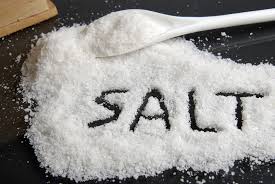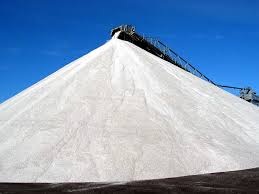We live in a culture in which condiments, like salt, pepper, mustard, ketchup, are so readily available that we take them completely for granted. We have lost our connection with the past, and are unlikely to understand metaphorical phrases like “you are the salt of the earth” in an age and a culture of excess. A healthy reminder comes from the recent excellent book The Monuments Men (both the movie and the book on which it is based reviewed elsewhere on this blog). What Edsel and Witter write about 1,000 years ago, applies even more so to 2,000 years ago.
“In those days, at the turn of the first millenium, salt was one of the foundations of civilization. Without it food couldn’t be preserved or transported, so whole societies survived because of salt. Roman legionaires were sometimes paid in salt (the basis of the English word ‘salary’), and the merchants trod the salt roads in large caravans, linking the Western world of Europe with the Eastern world of Asia and Arabia. In Tibet, Marco Polo noticed that salt was pressed into wafers, imprinted with the image of the Grand Khan, and used as money. Timbuktu, the great lost civilization of Africa, valued salt as highly as gold. The early Germans whose Visigoth ancestors sacked Rome and threw civilization into darkness, were economically dependent on their salt mines, and especially the taxes from their salt trading routes. The city of Munich, an early power base for the Nazi Party, was founded in 1158 so the ruler of Bavaria could more easily collect a tax on the salt being transported from the town of ‘Salzburg’ (German for Salt Castle).” (p. 304).
Some of our own idioms today hint at the importance of salt in the past, but also of the way we had come to take it for granted—- my father used to say after lunch– ‘well back to the salt mines’. All hard work was likened to that necessary task of digging out salt. Or consider ‘I’d take that with a grain of salt’ as an idiom, meaning don’t pay any more attention to that than you would a little grain of salt.
But whatever our idioms, they bear little evidence of just how crucial salt was in an age before refrigeration, especially in a tropical or sub-tropical climate like much of the Biblical world. So what did Jesus mean, when he said “you are the salt of the earth’. It’s one thing to be the light of the world, another to be the salt of the earth (Mt. 5.13). Some Biblical scholars, who frankly know too little archaeology or history, have complained that Jesus didn’t realize that salt cannot lose its savor. This is not quite true. Salt, for instance found in large quantities at the Dead Sea, if mixed with impurities certainly can lose something over time, or under some conditions.
So again what does Jesus mean by telling his disciples “You are the salt of the earth. But if the salt loses its saltiness, how can it be made salty again? It is no longer good for anything, except to be thrown out and trampled underfoot.” First of all, this is a wisdom saying, and the danger is, we may slide over it as a sort of quaint aphorism of sorts— taking it ‘with a grain of salt’. But actually Jesus is just as serious with this metaphor as he is with ‘you are the light of the world’. We ignore it at our peril.
Some scholars have suggested that Jesus is saying something about the role of his disciples in society. This makes good sense, especially if we take these two aphorisms in parallel— world in the light of the world saying, parallels earth in the salt of the earth saying. In that case it does indeed intend to say something about our intended effect on the world of humankind, and so speaks of our purpose. The job of Christians is not stay in their nice little safe salt shaker or holy huddle. It is not their job to withdraw from society (Amish like or in a monastic model). It is not their job to become self-focused or self-protective. It is their job to effect society for the good, remembering just how valuable light was in an age before electricity, and how valuable salt was in an age before all kinds of other preservatives and seasonings.
One of the clear take aways from this aphorism has to be that when Christians withdraw from society, from the marketplace, from politics, from being civic-minded, it is no surprise that the world goes rotten. It is partly our fault. For example, one of the reasons for the decline in public schools in terms of quality education in America is quite specifically the flight of white Christians into private Christian schools, or even home schooling. Indirectly, and perhaps in most cases unintentionally, these Christians have done exactly the opposite of what Jesus intended his disciples to do and be— provide salt to the earth and light to the world. Jesus says that when disciples do not mix with society, do not function as salt and light in the world, then they become useless, insipid. At the very least this means they cease to function as proper mission minded Christians.
Yesterday in chapel we had a remarkable chapel service involving a lay person from Atlanta named Robert Lufton (I believe) who has been working in inner city Atlanta for the sake of helping urban renewal in a Christian way. One of things that was the focus of his message is that if you really want to make a difference, you don’t provide services for the poor from the outside except in an emergency or crisis (like say Katrina), you go in and embed yourself with the poor, and work with them, not for them as patrons, but with them, preserving their dignity, enabling them to gain skills and income to mostly support themselves. They are mostly not looking for a hand out, but a hand up…. so to speak. But the key was going and living among them. I have a good friend and former colleague named Rhonda Stapleton. She has done this for years in Florida working with battered and abused women. And has made a real difference, by coming along side them, instead of trying to hand them something, and then leaving them to their former condition. Rhonda is busy being salt and light. How about you, asks Jesus? Are you functioning for the Christian purpose for which God re-made you? Notice that Jesus does not say “now I want some of you disciples to be light, and some to be salt, and some to be something else….” Nope. Its not different strokes for different folks in this case. Rather he just makes a declaration— ‘all disciples are already salt and light and to be like a city set on a hill’. And if they are not doing and being that….. well then they are useless. Light hidden under a bed is light out of place and is unhelpful. The same applies to salt that loses its zing, its ability to preserve and add zest to life.
Think on these things.
“















